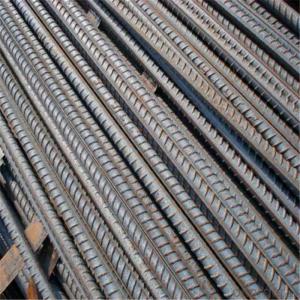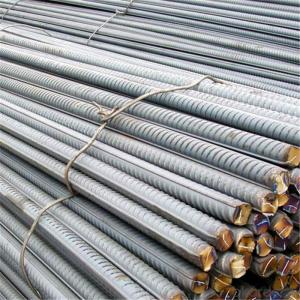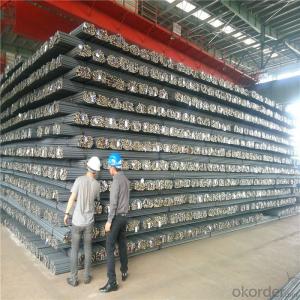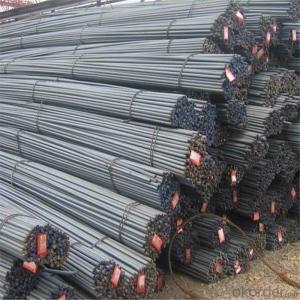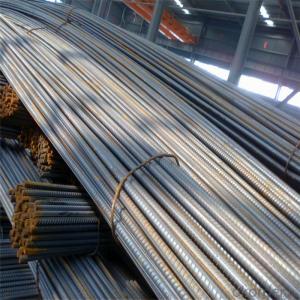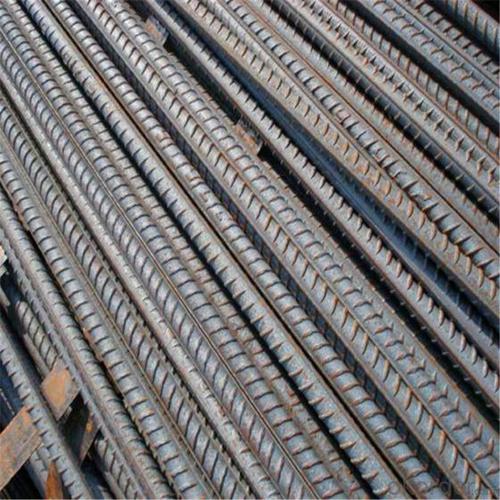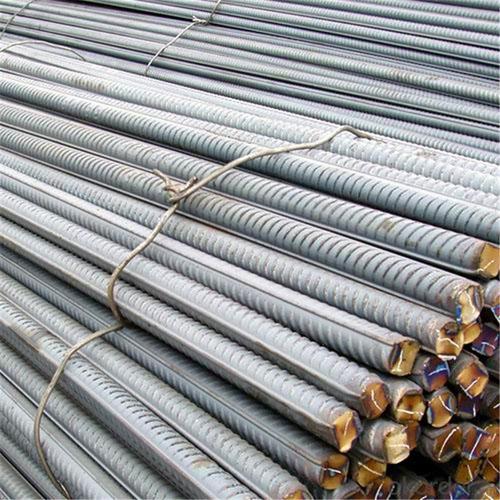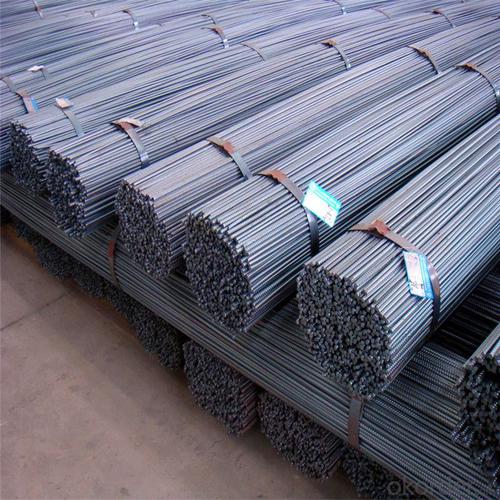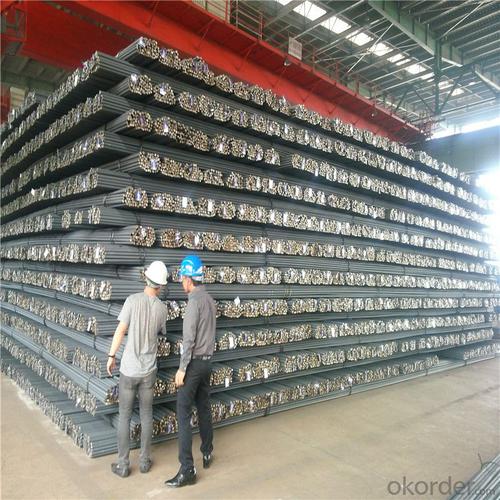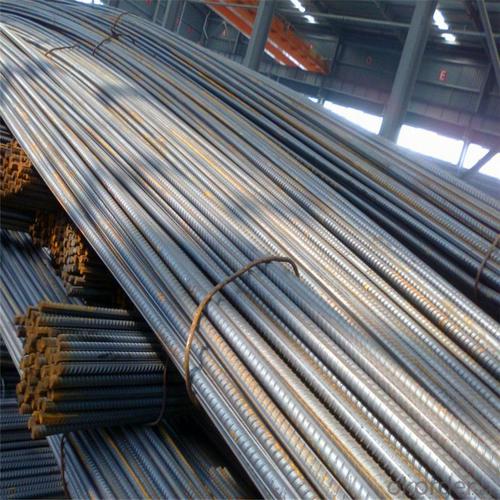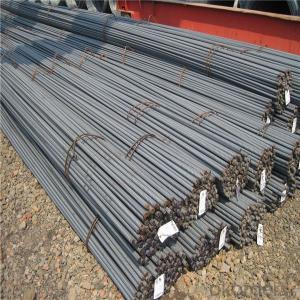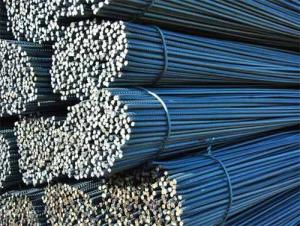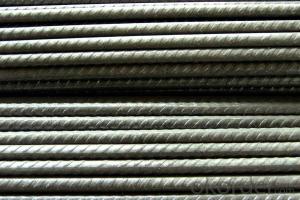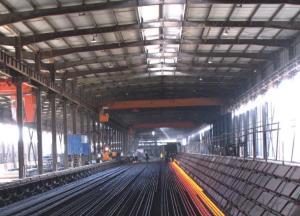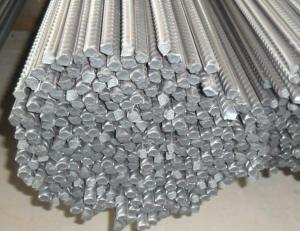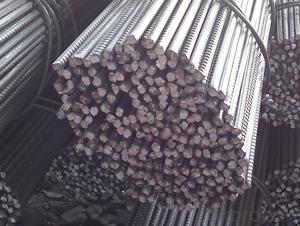Cold Rolled Ribbed Bars 6mm 8mm 10mm 12mm
- Loading Port:
- Tianjin
- Payment Terms:
- TT or LC
- Min Order Qty:
- 100 m.t.
- Supply Capability:
- 500000 m.t./month
OKorder Service Pledge
OKorder Financial Service
You Might Also Like
Specification
Cold Rolled Ribbed Bars 6mm
Description of Cold Rolled Ribbed Bars 6mm
1, Diameter: 5.5mm-10mm Cold Rolled Ribbed Bars 6mm
10m- 40mm Cold Rolled Ribbed Bars 6mm
2, Length: 6m, 9m, 12m or customized
3, Standard: GB, ASTM, AISI, SAE, DIN, JIS, EN
OEM technology - send detailed technical parameters for accurate quotation.
2, Produce Process: smelt iron - EAF smelt billet - ESR smelt billet -
hot rolled or forged to get the steel round bar and plate
3, Heat Treatment: annealing, normalizing, tempering, quenching
4, Surface Treatment: Black
5, Quality Assurance: We accept third party inspection for all orders.
You can ask testing organizations such as SGS, BV, etc. to test our products before shipping.
Chemical Composition of Cold Rolled Ribbed Bars 6mm
Grade | Technical data of the original chemical composition(%) | |||||
Reinforcing steel bar HRB335 | C | Mn | Si | S | P | B |
≤0.25 | ≤1.60 | ≤0.80 | ≤0.045 | ≤0.045 | >0.0008 | |
Physics Capability | ||||||
Yield Strength(N/cm2) | Tensile Strength(N/cm2) | Elongation(%) | ||||
≥ 335 | ≥490 | ≥16 | ||||
Reinforcing steel bar HRB400 | C | Mn | Si | S | P | B |
≤0.25 | ≤0.16 | ≤0.80 | ≤0.045 | ≤0.045 | 0.04-0.12 | |
Physics Capability | ||||||
Yield Strength(N/cm2) | Tensile Strength(N/cm2) | Elongation(%) | ||||
≥ 400 | ≥ 570 | ≥ 14 | ||||
Products Show of Cold Rolled Ribbed Bars 6mm
Company Information
CNBM International Corporation is the most important trading platform of CNBM group.
Whith its advantages, CNBM International are mainly concentrate on Cement, Glass, Iron and Steel, Ceramics industries and devotes herself for supplying high qulity series of refractories as well as technical consultancies and logistics solutions.


F A Q
1, Your advantages?
professional products inquiry, products knowledge train (for agents), smooth goods delivery, excellent customer solution proposale
2, Test & Certificate?
SGS test is available, customer inspection before shipping is welcome, third party inspection is no problem
3, Factory or Trading Company?
CNBM is a trading company but we have so many protocol factories and CNBM works as a trading department of these factories. Also CNBM is the holding company of many factories.
4, Payment Terms?
30% TT as deposit and 70% before delivery.
Irrevocable L/C at sight.
5, Trading Terms?
EXW, FOB, CIF, FFR, CNF
6, After-sale Service?
CNBM provides the services and support you need for every step of our cooperation. We're the business partner you can trust.
For any problem, please kindly contact us at any your convenient time.
We'll reply you in our first priority within 24 hours.
- Q: Can special steel be used in the energy sector?
- Yes, special steel can be used in the energy sector. Special steel, which is engineered and designed to have specific properties like high strength, corrosion resistance, and heat resistance, can be utilized in various applications within the energy sector. It can be used for manufacturing components of power plants, such as turbines, generators, boilers, and heat exchangers, as well as in offshore oil and gas platforms, pipelines, and wind turbines. The unique properties of special steel make it suitable for withstanding the demanding conditions and requirements of the energy sector, ensuring reliability and longevity of these critical infrastructure components.
- Q: How is shock-resistant steel used in the production of impact tools?
- Shock-resistant steel is used in the production of impact tools to enhance their durability and resistance to breaking or chipping under high impact forces. This steel has been specifically designed to absorb and distribute the energy created by the impact, thereby preventing any damage or deformation to the tool. By using shock-resistant steel, impact tools can withstand heavy usage and deliver consistent performance, making them ideal for applications where repeated high-force impacts are involved, such as construction, automotive, or manufacturing industries.
- Q: How does special steel contribute to the telecommunications equipment industry?
- The telecommunications equipment industry greatly relies on special steel to support its complex infrastructure and advanced technologies. Special steel plays a critical role by providing the necessary strength, durability, and reliability. An important aspect of special steel is its ability to withstand extreme weather conditions and environmental factors. Telecommunications equipment, such as transmission towers, antennas, and satellites, often face harsh elements like strong winds, heavy rain, and earthquakes. Special steel, with its high tensile strength and resistance to corrosion, ensures the stability and longevity of the infrastructure, minimizing the risk of damage or failure. Additionally, special steel is used in the production of various components for telecommunications equipment. Connectors, cables, and electronic enclosures, for example, require materials with excellent electrical conductivity and heat dissipation properties. Special steel alloys, including stainless steel or nickel-based alloys, are utilized to meet these requirements, ensuring efficient signal transmission and preventing overheating issues. Furthermore, special steel is crucial for manufacturing high-quality tools and equipment used in the installation, maintenance, and repair of telecommunications networks. Specialized steel alloys, such as tool steel, provide exceptional hardness, toughness, and wear resistance, enabling the production of reliable and long-lasting tools. These tools are essential for professionals in the telecommunications industry as they allow for efficient and accurate installation and maintenance, ensuring uninterrupted connectivity for end-users. Moreover, as the telecommunications industry continues to advance, special steel is vital in supporting the deployment of advanced technologies like 5G networks and fiber-optic systems. These technologies require specialized components, such as waveguides, reflectors, and amplifiers, often made from special steel alloys to ensure optimal performance and durability. By providing the necessary materials for these cutting-edge technologies, special steel contributes to the expansion and enhancement of telecommunications infrastructure worldwide. In conclusion, special steel is indispensable to the telecommunications equipment industry due to its strength, durability, and reliability, which are crucial for infrastructure, components, tools, and advanced technologies. Its unique properties enable the industry to provide efficient and uninterrupted communication services to individuals and businesses globally.
- Q: What are the different methods for improving the magnetic properties of special steel?
- There are several methods for improving the magnetic properties of special steel, including annealing, alloying, and heat treatment. Annealing involves heating the steel to a specific temperature and then slowly cooling it, which helps to refine the grain structure and reduce magnetic losses. Alloying is another method, where specific elements like nickel or cobalt are added to the steel to enhance its magnetic properties. Heat treatment is also commonly used, involving controlled heating and cooling processes to alter the microstructure and improve magnetic performance.
- Q: How does special steel contribute to the manufacturing of precision components?
- Special steel plays a crucial role in the manufacturing of precision components by offering superior strength, durability, and resistance to wear and corrosion. Its unique properties allow for the production of complex and intricate parts that require high levels of precision and accuracy. Additionally, special steel often exhibits excellent machinability, enabling manufacturers to achieve tight tolerances and fine finishes. Overall, special steel enhances the performance and reliability of precision components, making it an essential material in the manufacturing industry.
- Q: How is martensitic steel used in knife making?
- Martensitic steel is commonly used in knife making due to its high hardness and excellent edge retention properties. Its ability to be heat treated and tempered makes it ideal for creating sharp and durable knife blades. The steel's fine grain structure allows for precise and detailed work, resulting in high-quality and long-lasting knives.
- Q: What are the different methods of coating special steel?
- There are several different methods of coating special steel, including galvanizing, electroplating, powder coating, and thermal spraying. Galvanizing involves dipping the steel in a bath of molten zinc to create a protective layer. Electroplating uses an electric current to deposit a thin layer of metal onto the steel surface. Powder coating involves applying a dry powder to the steel and then curing it with heat to form a durable coating. Thermal spraying uses a high-velocity stream of molten or semi-molten material to create a protective layer on the steel.
- Q: How does special steel contribute to the hardness of products?
- The hardness of products is enhanced by special steel due to its distinct composition and manufacturing techniques. Unlike regular steel, special steel is mixed with additional elements like chromium, nickel, and manganese, which bolster its strength and durability. These alloying elements combine with the steel matrix to form solid solutions, resulting in a more rigid and compact structure. The inclusion of these alloying elements in special steel allows for the creation of diverse microstructures, including fine-grained structures and martensitic structures, which significantly increase the steel's hardness. Moreover, special steel often undergoes heat treatment processes such as quenching and tempering, which further refine its microstructure and enhance its hardness. Furthermore, the hardness of special steel can also be influenced by the manufacturing processes employed, such as hot rolling or cold working. These processes deform the steel, align its grain structure, and minimize any defects or impurities, resulting in a more uniform and harder material. The hardness of special steel plays a vital role in various industries where strength, wear resistance, and resistance to deformation are crucial. For instance, in the automotive industry, special steel is utilized in the production of engine parts, gears, and axles, all of which require high hardness to withstand challenging conditions and loads. Similarly, in the construction industry, special steel is used for manufacturing tools, cutting blades, and reinforcement bars, where hardness is essential for longevity and performance. In conclusion, special steel's contribution to product hardness is attributed to its unique alloying elements, manufacturing techniques, and heat treatments. Its ability to form various microstructures and its resistance to deformation make it an excellent material for applications where hardness is vital for performance and durability.
- Q: What are the properties of low-alloy steel?
- Low-alloy steel is a type of steel that has a relatively low amount of alloying elements, typically less than 5%. It possesses several properties that make it suitable for various applications. Low-alloy steel is known for its high strength, toughness, and durability, making it resistant to wear, fatigue, and impact. It also exhibits good weldability and machinability, allowing for easy fabrication and forming. Additionally, low-alloy steel has excellent corrosion resistance due to the presence of alloying elements, such as chromium, nickel, and molybdenum. Overall, the properties of low-alloy steel make it a versatile material used in industries such as construction, automotive, and manufacturing.
- Q: What are the properties of electrical resistance steel?
- Electrical resistance steel is characterized by its high resistivity, which means it offers high resistance to the flow of electric current. It also exhibits good electrical conductivity, ensuring efficient transmission of electric power. Additionally, electrical resistance steel typically has a low temperature coefficient of resistance, meaning its resistance does not change significantly with temperature fluctuations. These properties make it suitable for various applications, such as in electrical resistors, heating elements, and electrical wiring where controlled resistance and durability are required.
Send your message to us
Cold Rolled Ribbed Bars 6mm 8mm 10mm 12mm
- Loading Port:
- Tianjin
- Payment Terms:
- TT or LC
- Min Order Qty:
- 100 m.t.
- Supply Capability:
- 500000 m.t./month
OKorder Service Pledge
OKorder Financial Service
Similar products
Hot products
Hot Searches
Related keywords
